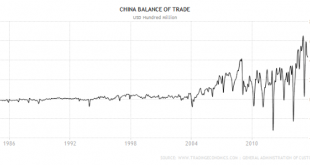There is a huge amount of hysteria about government debt and deficits, not just in the UK but throughout much of the world. As I write, Brazil has been downgraded by Standard & Poors because of concerns about rising government debt and weakening commitment to primary fiscal surpluses in a context of political uncertainty and deepening recession. It is the latest in a long line of downgrades and investor flight over the last few years. The global economy is a very stormy place.The UK,...
Read More »“Quantitative Tightening” is a myth
(But that doesn't mean we don't have a problem).Deutsche Bank has frightened everyone by warning that if China sold substantial quantities of US Treasuries (USTs) to support the yuan, this would amount to a substantial tightening of US monetary policy.The reason why China accumulated USTs in the first place was because of its trade surplus: The excess of exports over import sucked dollars into China, where the People’s Bank of China (PBoC) exchanged them for domestic currency (yuan). The...
Read More »The real purpose of central banks
One of the things that has emerged from the PQE debate is a suggestion that it is time to consider ending the Bank of England's inflation-targeting mandate. Unfortunately this got mixed up with calls for ending the operational independence of the Bank of England (Richard Murphy), or abolishing central banks (Bill Mitchell, stated in response to a question at Reframing the Progressive Agenda).What we might call the "twin peaks" approach to macroeconomic policy-setting has been adopted the...
Read More »PQE, inflation and the problem of voter power
I have repeatedly said that I do not support Jeremy Corbyn's "People's QE". But there seems to be considerable confusion about what exactly I oppose. And that is for one simple reason: the deliberate conflation of government investment spending and QE by the architect of this scheme. PQE is composed of two separate and distinct strands: 1. Government spending to finance investment in infrastructure, innovation, R&D and housing 2. Bank of England purchases of government bonds. ...
Read More »Monetary Snake Oil
Guest post by Paddy Carter. Jeremy Corbyn’s People’s QE offers the alluring prospect of spending more without borrowing more. Which is just the ticket, if you want to replace austerity with largesse, and cut the deficit to boot. Sadly, this appealing miracle cure is pure snake oil (although there is, perhaps, a version of the idea which might be helpful, if substantially less miraculous). The basic idea behind People’s QE is to finance public spending by printing money. This is actually...
Read More »Europe’s Shame
I am temporarily departing from my usual finance & economics slant to write about something that I consider utterly shameful: the response of European countries, including my own, to the refugee crisis on their borders.This photo was taken on the Macedonian border today: : Herbert Mayrhofr tweeted this with a comment, "This is not the Europe that I want to live in".I wholeheartedly agree. What kind of society is it that will threaten toddlers with police batons?Many argue that Europe...
Read More »Making the case for public investment
Jeremy Corbyn’s “People’s QE” scheme has been extensively discussed in the media. In fact it has caused something of a storm. The FT’s Chris Giles did an excellent balanced analysis of it, and there have also been useful contributions from – among others - Oxford University’s Simon Wren-Lewis, The Economist’s Buttonwood and FT Alphaville’s Matt Klein. The extent of discussion is far more, in my view, than the scheme deserves. The scheme envisages that the Government, via a public...
Read More »The Co-Op Bank: too high a mountain?
The Co-Op Bank has revealed its 2015 half-year results. And they are not pleasant reading. It has made a statutory loss before taxation of £204m, considerably worse than the £77m loss reported in the 2014 half-year accounts. And the Board advises that the bank will not return to profit for another couple of years.The background to this horrible report is the Bank of England's stress tests last autumn. I didn't bother to look at the results at the time, since it was always obvious that the...
Read More »Never mind Greece, look at Venezuela
Via Business Insider comes this colourful map and chart of CDS spreads worldwide: Those who thought Greek bonds would be the most expensive to insure, since everyone knows it can't pay its debts, need to think again. Venezuela is the most expensive, by a long way. Related to that is this: The yield curve has been deeply inverted all year, but yields at all maturities are now rising: When even the yield on long-dated bonds is heading for 30%, the public finances are completely...
Read More »A Finnish cautionary tale
Eurozone growth figures came out today. And they are horribly disappointing. Everyone undershot, apart from Spain which turned in a remarkable 1% quarter's growth, and Greece which somehow managed an even more incredible 0.8% (yes, I will write about this, but not in this post). France didn't grow at all, Italy all but stagnated at 0.2%, and even the mighty Germany only managed 0.4%. Despite low oil prices, falling commodity prices, weak Euro and the ECB's QE programme, Eurozone...
Read More » Francis Coppola
Francis Coppola










